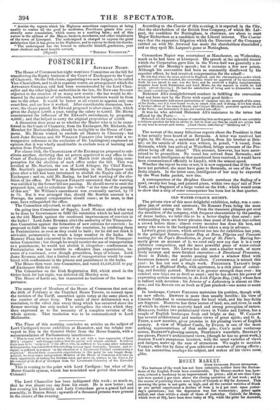POSTSCRIPT.
SATURDAY NIGHT.
The House of Commons last night went into Committee on the bill for transferring the Equity business of the Court of Exchequer to the Court of Chancery. On the 19th clause, appointing two new Judges, to be called Vice-Chancellors, and to sit in separate courts, an arrangement which the ATTORNEY-GENERAL said had been recommended by the Lord Chan- cellor and the other highest authorities in the law, Sir EDWARD SUGDEN objected to the creation of so many new courts : the bar would be dis- tracted by the number of tribunals, hurried as barristers would be from one to the other. It would be better at all events to appoint only one court first, and see bow it worked. After considerable discussion, how- ever, the clause passed. Sir Edward proposed to alter clause 35th, which gives the Judges 5,000/. a year, raising the salary to 6,000/. Mr. Hams counteracted the influence of Sir Edward's amendment, by proposing 4000/. ; and that helped to carry the original proposition of 5,000/. A discussion then arose as to whether the Master who is to be trans- ferred to the Court of Chancery, from the Exchequer, Mr. Richards, the Member for Merionethshire, should be reeligible to the House of Com- mons. Mr. Hintz wished to exclude all Masters in Chancery ; but Lord JOHN RUSSELL and Sir WELLLun Fotturr (the latter with a re- trospective reference to the exclusion of Dr. Lushington) expressed an opinion that it was wholly unadvisable to exclude men of learning and station from Parliament.
For clause 56th, the CHANCELLOR of the EXCHEQUER proposed to sub- stitute another, declaring that no person appointed to any office in the Court of Exchequer after the 14th of March 1840 should claim com- pensation for the abolition of such office under the bill. This was levelled at Mr. Scarlett, the son of Lord Abinger, the Chief Baron. Mr. Scarlett's appointment to a Mastership in the Exchequer took place after a bill had been introduced to abolish the Equity side of the Exchequer ; and so, said Mr. Baring, he had had warning of the abo- lition of the office. Sir Wimmera FottsTr contended that the warning was nullified by the former bill not passing. He should move to omit the proposed date, and to substitute the words "at the time of the passing of this act." Sir William's amendment was eventually carried, by 73 to 70. But it was arranged that, should Mr. Scarlett succeed to a Peerage, the annual compensation should cease ; as he must, in that ease, have relinquished the office.
The Committee adjourned, to sit again on Monday.
On going into Committee of Supply, Lord MAHON asked what was to be done by Government to fulfil the resolution which he had carried on the 23d March against the continued imprisonment of convicts in the bulks? Lord JOHN RUSSELL cited the authority of the Transporta- tion Committee against the formation of new colonies for convicts : he proposed to fulfil the vague terms of the resolution, by confining them in Penitentiaries, as soon as they could be built ; for he did not think it advisable permanently to retain a large number in the hulks. Sir ROBERT PEEL had concurred in the recommendations of the Transpor- tation Committee ; but though he would restrict the use of transportation as a punishment, he would not abolish it altogether : confinement in Penitentiaries was less terrible to offenders than expatriation, be- cause of a continued, even though groundless, hope of release. Lord JOHN RUSSELL said, that a limited use of transportation would be com- bined with confinement in the prisons and punishment in the hulks.
The House then went into Committee, and voted 21,626,355/. to pay off Exchequer Bills for 1841. The Committee on the Irish Registration Bill, which stood in the Order-book for last night, was deferred till Monday next.


























 Previous page
Previous page